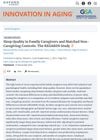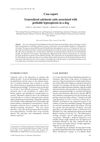 2 citations,
June 2023 in “Plants”
2 citations,
June 2023 in “Plants” Sugars from Sargassum and brown algae may have health benefits like fighting viruses and helping with wound healing, but there are challenges in using them.
September 2023 in “International journal of molecular sciences” Pinus densiflora extract may help improve memory and reduce brain inflammation.
 January 2023 in “Karger Kompass. Dermatologie”
January 2023 in “Karger Kompass. Dermatologie” Scientists are still unsure what triggers the immune system to attack hair follicles in Alopecia areata.
 January 2019 in “Springer eBooks”
January 2019 in “Springer eBooks” Modified HDL can better deliver drugs and genes, potentially improving treatments and reducing side effects.
 September 2018 in “Asian journal of pharmacy and pharmacology”
September 2018 in “Asian journal of pharmacy and pharmacology” Honey has many health benefits and is good for you.
 July 2018 in “Elsevier eBooks”
July 2018 in “Elsevier eBooks” Up to half of people experience itchy scalp, often due to skin conditions like seborrheic dermatitis or psoriasis, and treatments vary based on the specific cause.
 December 2021 in “Innovation in Aging”
December 2021 in “Innovation in Aging” Family caregivers take longer to fall asleep and have more sleep disturbances, which may contribute to their health problems.
30 citations,
August 2021 in “Journal of Ethnopharmacology” Akebia quinata and Akebia trifoliata have many health benefits and potential medical uses.
 20 citations,
July 2015 in “Journal der Deutschen Dermatologischen Gesellschaft”
20 citations,
July 2015 in “Journal der Deutschen Dermatologischen Gesellschaft” Green tea may help with skin health and protect against UV damage, but more research is needed to confirm its safety and effectiveness.
 9 citations,
March 2019 in “Anthropology and Medicine”
9 citations,
March 2019 in “Anthropology and Medicine” PCOS in India is linked to broader sociocultural and environmental changes, not just diet and exercise.
 106 citations,
July 2013 in “Advances in wound care”
106 citations,
July 2013 in “Advances in wound care” UV radiation can help sterilize wounds and promote healing but requires careful use to avoid damaging cells.
 103 citations,
January 2009 in “Carbon”
103 citations,
January 2009 in “Carbon” Pure carbon nanotubes are safe for mice, but impure ones cause immune issues and hair loss.
 13 citations,
November 2005 in “Veterinary Dermatology”
13 citations,
November 2005 in “Veterinary Dermatology” A dog's skin calcification condition resolved without treatment after a bacterial infection.
 10 citations,
May 2021 in “Expert Opinion on Drug Delivery”
10 citations,
May 2021 in “Expert Opinion on Drug Delivery” Coenzyme Q10 vesicular formulations can potentially treat androgenic alopecia by promoting hair growth and thickness.
 10 citations,
February 2007 in “Clinical techniques in small animal practice”
10 citations,
February 2007 in “Clinical techniques in small animal practice” Dogs with sex hormone imbalances may not drink or pee a lot but often lose hair on their body and can have reproductive system issues.
7 citations,
February 2017 in “Open veterinary journal” Tiger cubs fed artificial milk lacking certain amino acids developed eye problems and hair loss.
 2 citations,
January 2016 in “Springer eBooks”
2 citations,
January 2016 in “Springer eBooks” Fat tissue stem cells show promise for repairing different body tissues and are being tested in clinical trials.
 1 citations,
October 2023 in “Romanian Journal of Morphology and Embryology”
1 citations,
October 2023 in “Romanian Journal of Morphology and Embryology” COVID-19 can cause various skin issues, but long-term skin problems are rare.
 February 2012 in “Clinical and Experimental Dermatology”
February 2012 in “Clinical and Experimental Dermatology” Many adult women experience unexplained excessive hair shedding, often starting before age 40.
 95 citations,
February 2018 in “Dermatology and Therapy”
95 citations,
February 2018 in “Dermatology and Therapy” Nutraceuticals may improve skin health and protect against aging, but more research is needed on their optimal use and possible health risks.
 15 citations,
July 1999 in “Dermatologic Clinics”
15 citations,
July 1999 in “Dermatologic Clinics” The document concludes that immune system abnormalities cause alopecia areata, but the exact process is still not completely understood.
 27 citations,
May 2016 in “Dermatologic Surgery”
27 citations,
May 2016 in “Dermatologic Surgery” Male faces age with more wrinkles and hair loss, influenced by both body changes and environmental factors.
 15 citations,
April 2003 in “Journal of dermatology”
15 citations,
April 2003 in “Journal of dermatology” Alopecia areata causes hair loss due to an immune attack on hair follicles, influenced by genetics and environment.
 5 citations,
March 2011 in “Journal of pediatric health care”
5 citations,
March 2011 in “Journal of pediatric health care” The girl with autoimmune hair loss might regrow hair within a year, and treatments can help but not prevent recurrence; dermatologist referral and corticosteroids are recommended.
 January 2016 in “Springer eBooks”
January 2016 in “Springer eBooks” The document concludes that there are various causes and treatments for hair loss, with hair transplantation being a notable option.

No treatment alters the natural progression of alopecia areata, and effectiveness varies, with some possibly working better in children.
 30 citations,
January 2014 in “Dermatologic Clinics”
30 citations,
January 2014 in “Dermatologic Clinics” Tight hairstyles, especially on chemically treated hair, can cause reversible hair loss if caught early but may become permanent if not addressed.
16 citations,
January 2022 in “International journal of molecular sciences” Certain daily habits like stress, diet, and sleep can affect the severity of hair loss in alopecia areata.
 April 2016 in “Journal of Investigative Dermatology”
April 2016 in “Journal of Investigative Dermatology” A peptide known for reducing wrinkles also effectively inhibits an enzyme linked to skin inflammation and acne.
 2 citations,
August 2022 in “Clinical Case Reports”
2 citations,
August 2022 in “Clinical Case Reports” A 17-year-old girl had severe, on-and-off hair loss, likely due to COVID-19. She was treated with Vitamin D3, biotin, and other supplements, and saw some improvement within a month.

























